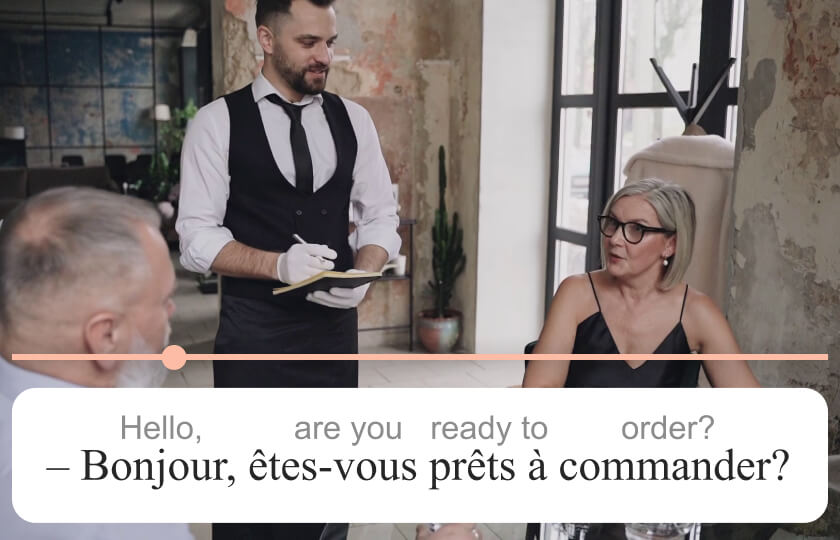Mastering French pronunciation can be one of the trickiest parts of learning the language. Those beautiful, flowing sounds and the tricky nasal vowels can make even the most confident learner a bit hesitant. But don’t worry! With the right tools, you can turn this challenge into a fun and rewarding experience.
Mobile apps are a fantastic way to practice pronunciation anytime, anywhere. They offer interactive and engaging ways to improve your speaking skills, making it easier to sound like a native. Let’s dive into some of the best apps for French pronunciation. As a bonus, we’ll look at some additional resources to make your learning even more effective.
Sidenote: If you’re interested in learning the language beyond improving your pronunciation, here is a comprehensive review of the best apps to learn French.
Pimsleur
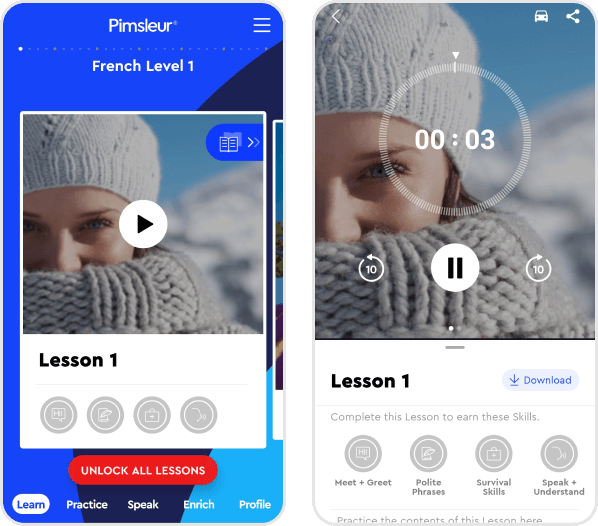
Pimsleur is known for its audio-based learning method. The app makes you listen and repeat phrases, helping you to develop an ear for the language’s sounds and rhythms. With Pimsleur, you can practice while commuting, exercising, or doing chores, making it very convenient for busy learners. However, the lessons are on the longer side and some people find them somewhat repetitive.
Pros
- Focus on listening and speaking: Designed to get you speaking right from the start, with clear pronunciation examples repeated enough times for anyone to get them.
- Pronunciation exercises: In addition to the main lessons, there are extra features aimed specifically at developing correct pronunciation, although they don’t always work perfectly.
- Great for multitasking: The audio-based lessons allow you to practice French while doing something else.
Cons
- Narrow focus: You’ll mainly do listening and speaking, so you’ll need additional resources to work on reading, writing, and grammar.
- Slow pace: The lessons are thorough but can feel repetitive, which might not suit everyone’s learning style.
- Costly: The subscription is expensive compared to most other language learning apps.
Pricing
- $21/month in the US ($252/year). Prices may vary in other countries.
- 7-day free trial. Might not be available for some plans.
Busuu
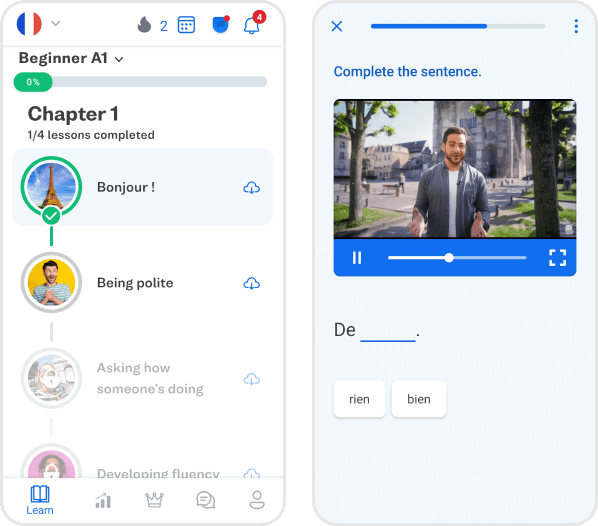
Busuu is a comprehensive language learning app that offers a wide range of features, including pronunciation practice. Alongside the main course, which covers all topics and skills, the app includes a specialized mini course for practicing the pronunciation of French sounds, available exclusively to subscribers. Another notable feature is Busuu’s community support, allowing you to get feedback on your pronunciation from native speakers. While the app is a solid choice for any language learner, some users feel that the lessons are too brief and simplified.
Pros
- Community feedback: Allows you to record responses to exercises and ask native speakers for feedback, which is incredibly valuable for improving pronunciation.
- Pronunciation course: Has a mini course aimed specifically at helping you sound more like a native speaker. This is a paid feature.
- Human touch: Many words and phrases in lessons have videos of native speakers saying them, which helps with pronunciation and listening skills.
- Grammar tips: Includes fairly detailed explanations of grammar rules, helping you understand the structure of the French language.
- Free version: Allows you to learn in exchange for viewing ads, but the learning experience is somewhat limited.
Cons
- Short lessons: Often after completing a lesson, it feels like you didn’t quite memorize the new material and some details weren’t covered.
- Quality of feedback varies: While it’s great that you can connect with native speakers, the quality and usefulness of their responses aren’t always consistent.
- Technical issues: Some users report that the app doesn’t always understand their voice or has issues with their microphone.
Pricing
- Free version: Limited access to lessons and features, ads.
- Paid version: $83/year in the US. Prices may vary in other countries.
- Shorter-term plans are also available.
Memrise
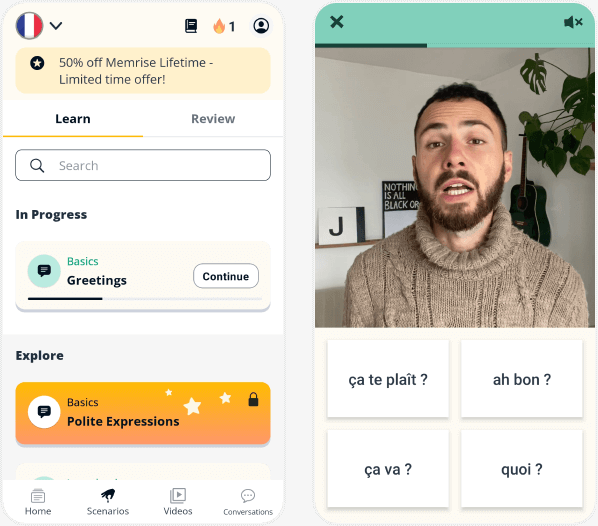
Memrise focuses on building your vocabulary through spaced repetition. It’s designed to make learning new words and phrases enjoyable, using a variety of gamification techniques and real-life video clips from native speakers. The app provides an opportunity to hear different accents and helps you practice pronunciation, although it doesn’t really focus on speaking. The downside of Memrise is that it doesn’t train many skills required to communicate in French, prioritizing mainly vocabulary building.
Pros
- Videos: Real-life videos of native speakers improve your pronunciation and listening skills by exposing you to authentic accents.
- Spaced repetition: Helps keep words fresh in your memory by reviewing them at optimal times, ensuring long-term retention.
- Mnemonic techniques: Uses memory aids to help you remember words and phrases through associations, making learning more effective.
- Engaging and fun: The gamified elements make learning feel like playing a game, keeping you motivated and entertained.
- Free version: The basic version of the app is free, but the amount of learning you can do per day is limited, as is access to some lessons and features.
Cons
- Not comprehensive: While excellent for vocabulary, it doesn’t cover all aspects of the language, so you’ll need to supplement it with other learning resources.
- Limited grammar focus: Doesn’t dive deep into grammar rules. You’ll have to learn them elsewhere.
- Requires internet: Most features need an internet connection, which might be a drawback if you want to study offline.
Pricing
- Free version: Limited access to lessons and features.
- Paid version: $72/year in the US. Prices may vary in other countries.
- Several shorter- and longer-term plans are also available.
Babbel
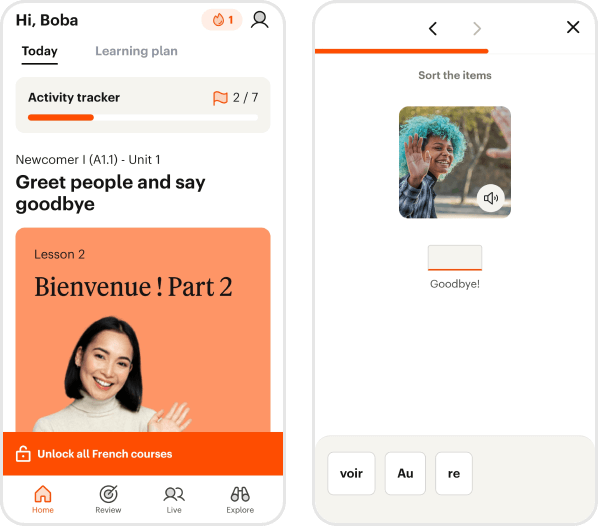
Babbel is a well-rounded app with expertly-made topical lessons. It can build a solid foundation in grammar, vocabulary, conversation, and incorporates real-life scenarios to help learners use French in everyday situations. Similarly to Busuu, the main course includes only some speaking practice, but there is a short secondary course for practicing French sounds. Additionally, you can review finished lessons via speaking exercises. While it is an overall good choice, Babbel’s lessons can feel a little too academic and dry.
Pros
- Comprehensive: Well-rounded lessons with exercises that cover reading, listening, writing, and speaking.
- Pronunciation course: Includes a mini course with speaking exercises for different French sounds. This is a paid feature.
- Speaking mode: Allows you to review past lessons in the speaking mode, providing additional pronunciation practice.
- Practical scenarios: Focuses on situations you’ll encounter in everyday life.
- Review sessions: Regular reviews help reinforce what you’ve learned, aiding long-term retention.
- Culture and grammar notes: Lessons include tips on grammar and fun facts about French culture.
Cons
- Dry lessons: The structured, classroom-like format can feel a bit boring, which could reduce motivation over time.
- Speaking is secondary: More focus on reading and writing, with fewer opportunities to practice speaking.
- Technical issues: Some users report that the app doesn’t pick up their voice or understand them when they speak at a normal pace.
Pricing
- $84/year in the US. Prices may vary in other countries.
- 7-day free trial.
- Shorter-term plans are also available.
Lingodeer
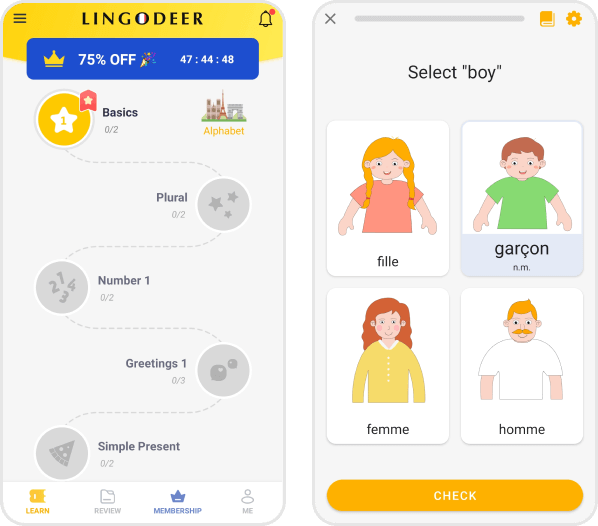
Lingodeer is a good app for those with a serious approach to learning French. While training all crucial language skills, the app particularly excels at explaining grammar and practicing speaking. Each unit has a section for practicing pronunciation, where you have to pronounce phrases covered in the main lessons and can compare the native pronunciation to yours. However, Lingodeer doesn’t teach as much vocabulary as other apps and doesn’t embed review lessons into the main course (they are kept in a separate section).
Pros
- Detailed lessons: Covers all aspects of the language, including listening, speaking, grammar, and vocabulary.
- Pronunciation practice: Each unit has a section for practicing speaking, where you can compare the native pronunciation to your own.
- High-quality audio: Offers great pronunciation examples from native speakers, ensuring you hear and mimic the correct sounds.
- Focus on grammar: Detailed grammar explanations help you understand the structure of the language, making it easier to form correct sentences.
Cons
- Limited vocabulary: Doesn’t teach as many new words and phrases as most other apps, focusing more on deep understanding and mastery of the material.
- Optional reviews: Doesn’t make you review the past lessons, allowing to forget a lot of the information that was already covered.
- Can be buggy: Some users report technical issues with the app.
Pricing
- $80/year in the US. Prices may vary in other countries.
- 7-day free trial.
- Shorter-term plans are also available.
More resources to improve your French pronunciation
In addition to using apps, there are other valuable tools that can familiarize you with how real native speakers talk and help you perfect your accent and sound more like a native speaker. Here are some excellent options to consider:
- Learn French with Alexa: A YouTube channel packed with short, fun videos on various topics, including grammar, vocabulary, and pronunciation. The videos are grouped into handy playlists, making it easy to find what you need.
- Coffee Break French: A popular podcast with 15-20 minute episodes. It offers a easy-to-follow learning path, progressing from beginner to advanced levels, with each season focusing on different aspects of the language. You can find it on all the popular podcast platforms.
- Forvo: A large pronunciation dictionary where you can hear native speakers from different places pronounce any word or phrase.
- Introduction to French Phonology: An audio course from the Foreign Service Institute aimed at helping you understand the sounds of the language and how to produce them accurately.
Also, check our article on the most common French words and phrases with pronunciation examples.
Final thoughts
With the right tools and consistent practice, you can significantly improve your French pronunciation and sound more like a native speaker. Mobile apps provide a convenient way to integrate speaking practice into your daily routine. Even though there aren’t many free apps, the top options are fairly affordable. Using other resources such as YouTube channels, podcasts, and pronunciation dictionaries can further speed up your progress. Combining different methods will give you a more comprehensive learning experience.
Remember, the key to success is consistency. Regular practice, no matter how small, will help you make steady progress. Stay motivated, keep practicing, and try to enjoy the process. Happy learning!
